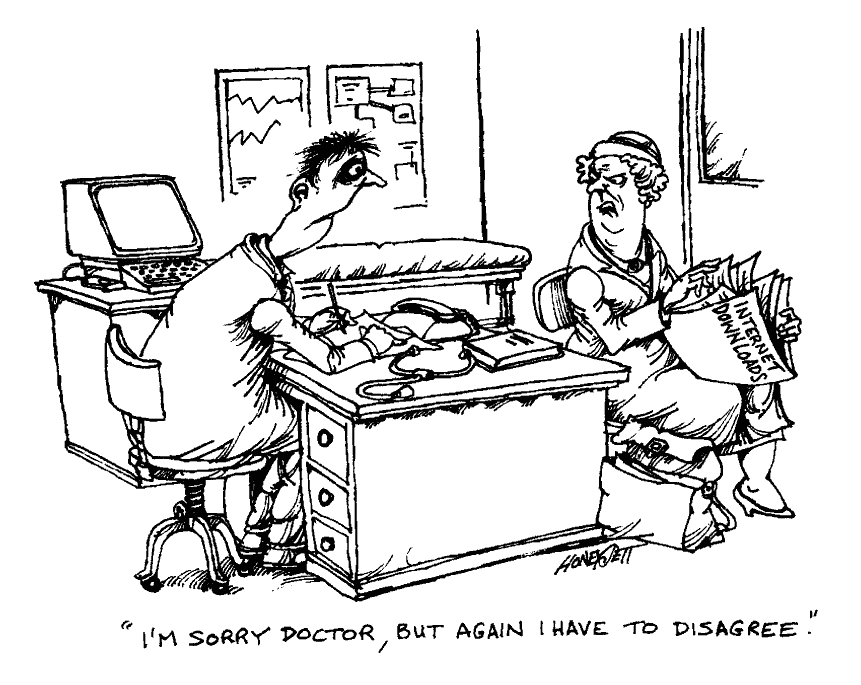This is why we must be our own health advocates!
Get a CBC every year & keep a book - a journal of
the results... Do it for your kids AND you!
June 23, 2010 -- Just over half of pediatricians responding to an anonymous survey acknowledged making at least one diagnostic error a month, and just under half said that at least once a year they made errors that harmed patients.The survey involved 726 academic and community-based pediatricians or pediatric residents practicing in Houston or Cincinnati.Diagnosing viral illness as bacterial infection was the most commonly reported diagnostic error, closely followed by failure to recognize the side effects of medication.
In all, 55% of the pediatric residents, 48% of the pediatricians working at academic centers, and 53% of community-based pediatricians reported that they had misdiagnosed viral illness as bacterial infection.
Antibiotics are useless for the treatment of colds, flu, or other viral infections, yet they are widely prescribed. The CDC and other health groups identify antibiotic overuse as one of the most significant public health problems.
“Prescribing antibiotics when they are not needed increases the risk for antibiotic resistance and it puts patients at risk for side effects,” Baylor College of Medicine pediatrician and study co-author Geeta Singhal, MD, tells WebMD.
Study First to Explore Misdiagnosis in Kids
Published in the July issue of the journal Pediatrics, the study is among the first to explore the frequency, types, and causes of diagnostic errors in pediatric practice.Slightly more than half of the academic center pediatricians and pediatric residents who responded to the survey reported misdiagnosing side effects of medicines taken by their young patients.
Singhal says adverse reactions to certain cough syrups and antihistamines are commonly misdiagnosed.
For example, first-generation antihistamines like the drugs Dimetapp and Benadryl typically make children sleepy, but they might have the opposite effect in children under age 2. Antihistamine-related hyper behavior in a very young child is often misdiagnosed, Singhal says.
Other key findings from the survey included:
- When asked to identify the reasons for diagnostic process errors, about half of the doctors (48%) cited a lack of information of the patient’s medical history or failure to review medical charts.
- Just over 40% said failure by the parent or caregiver to seek medical attention in a timely manner contributed to the diagnostic error and 39% cited failure to follow up on abnormal diagnostic lab tests.
- The pediatricians and pediatric residents cited better access to electronic health records and closer follow-up of patients after initial treatment as strategies most likely to reduce diagnostic errors in pediatric practice.
Electronic Records: ‘No Silver Bullet’
Study co-investigator Hardeep Singh, MD, MPH, says electronic medical records will help address the lack of coordination among medical providers, which is a major contributor to misdiagnosis in both general and pediatric medicine.Johns Hopkins University Medical School neurologist David Newman-Toker, MD, PhD, who has studied diagnostic errors, agrees. But he tells WebMD that much more is needed.
“It is clear to me after studying this issue that there is not going to be a single silver bullet that does away with diagnostic errors,” he says. “We will need multifaceted interventions to tackle the problem.”
Newman-Toker says it is no big surprise that the diagnostic errors are common in pediatric medicine, just as they are in general medicine.
In a commentary published in the Journal of the American Medical Association last year, Newman-Toker and Johns Hopkins colleague Peter J. Pronovost, MD, PhD, write that diagnostic errors result in as many as 40,000 to 80,000 hospital deaths each year in the United States.“I would think the risk of a fatal misdiagnosis is lower in children, because children have far fewer life-threatening medical conditions,” he says.
He adds that parents or caregivers who think their child’s illness has been misdiagnosed should never hesitate to discuss their concerns with the child’s physician.
Singh and Singhal agree.
“Families and caregivers know their children best,” Singhal says. “If they don’t understand the diagnosis or have concerns, it is important to talk to the pediatrician.”
Share


Nice post. Thanks for sharing....
ReplyDeletePediatric liver transplantation hospital in India